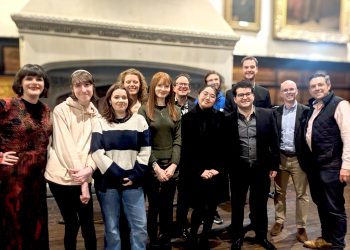I’ve been thinking quite a bit recently about the relationship between listening to music and watching a performance. A couple of things set me off wondering whether it’s important to be able to see clearly at a concert, and why we so often want to. On the other hand, with opera the answer to this ought to be obvious – surely, we want to see it, and this always put me off listening to operas that I hadn’t seen staged, but my responses to recent Radio 3 opera broadcasts, above all Daniel Barenboim’s extraordinary BBC Proms Ring Cycle have changed this.
Concerts first. I was at The Sixteen’s Choral Pilgrimage concert in Durham Cathedral a couple of weeks ago and could barely see a thing but I was in one of the best spots of the building for acoustics and it sounded marvellous – Durham Cathedral was not built with the modern concert audience in mind, and there’s definitely a trade off between audio and visual (to the extent that when I’m thinking about ticket pricing for Durham Singers concerts, I wonder whether putting the expensive seats at the front is the right thing to do). Not long after this, there was an exchange on Twitter about the behaviour of the arena regulars at the Proms, and complaints how some people apparently bag themselves front row places, and I puzzled over why someone would want to stand right next to the orchestra anyway when the result would be loud and unbalanced.
So why do we need to see at concerts? It can of course be great fun watching an orchestra or choir going about its business – you get to see details of players’ technique, their facial expressions tell all sorts of stories, and most interestingly you see how the conductor’s arm-waving translates into sound. On the other hand, the sight of a percussionist or a rank of trombones busying themselves for an entry can ruin the surprise – that big brass bit in the first movement of Tchaikovsky’s sixth symphony is no fun when you can see it coming. But all these visual clues are extras and can even be distracting – what’s important is the music. So why go to concerts at all in the age of high quality recordings? Everyone has their own reasons but here are mine. Firstly, however disciplined I try to be, I can rarely listen to music at home with anything like the concentration that I can apply in the concert hall. Then, there’s the thrill of a live performance, the knowledge that you’ll never hear this particular version again, and the awareness that you’re in the presence of highly talented and dedicated people who doing extraordinary things, just for your pleasure. And finally, a really well-thought out concert programme can set pieces off against each other, showing connections you’d never noticed before – The Sixteen did this for me this year by programming Palestrina and MacMillan together and suddenly their place on the same continuum of Roman catholic choral music seemed so obvious I couldn’t believe it hadn’t occurred to me before. So for me, what I see is less important than what I hear.
So to opera. Thanks to Twitter, I’m more aware these days of what’s going on and so if there’s a Radio 3 broadcast of something I wanted to see, I try to listen (working from home, in an undemanding job helps here!) and if I listen several times, I find I can start to follow what’s happening and feel a sense of the drama – ENO’s Medea and Aldeburgh’s Grimes on the Beach both helped me to come round to this way of thinking, and so this made me feel that I could tackle Barenboim’s Proms Ring Cycle via the radio. As I write, I’m listening to Götterdämmerung. I feel bad about this; I ought to be putting aside everything and immersing myself the way those lucky people at the Albert Hall were doing. Sadly the fact that the broadcasts are only on the i-player for a week means that I have to cram them in while doing other things. I can’t always follow them very well as my German isn’t good enough to pick out the plot, but Wagner’s music is so wonderfully expressive that it does half the job for you – this is something that I think has really come out in the reviews of this Proms Ring, where the orchestra have come in for so much deserved praise. I’m learning that when you listen to opera, you can, in fact, free yourself from someone else’s notion of how things should look, or any incongruities between the appearance of the singers and the supposed looks of the characters. I just have to let the music plant its own extravagant images in my mind: and just think – at the Albert Hall last Sunday, that means that the world was ending in 6000 different ways.







